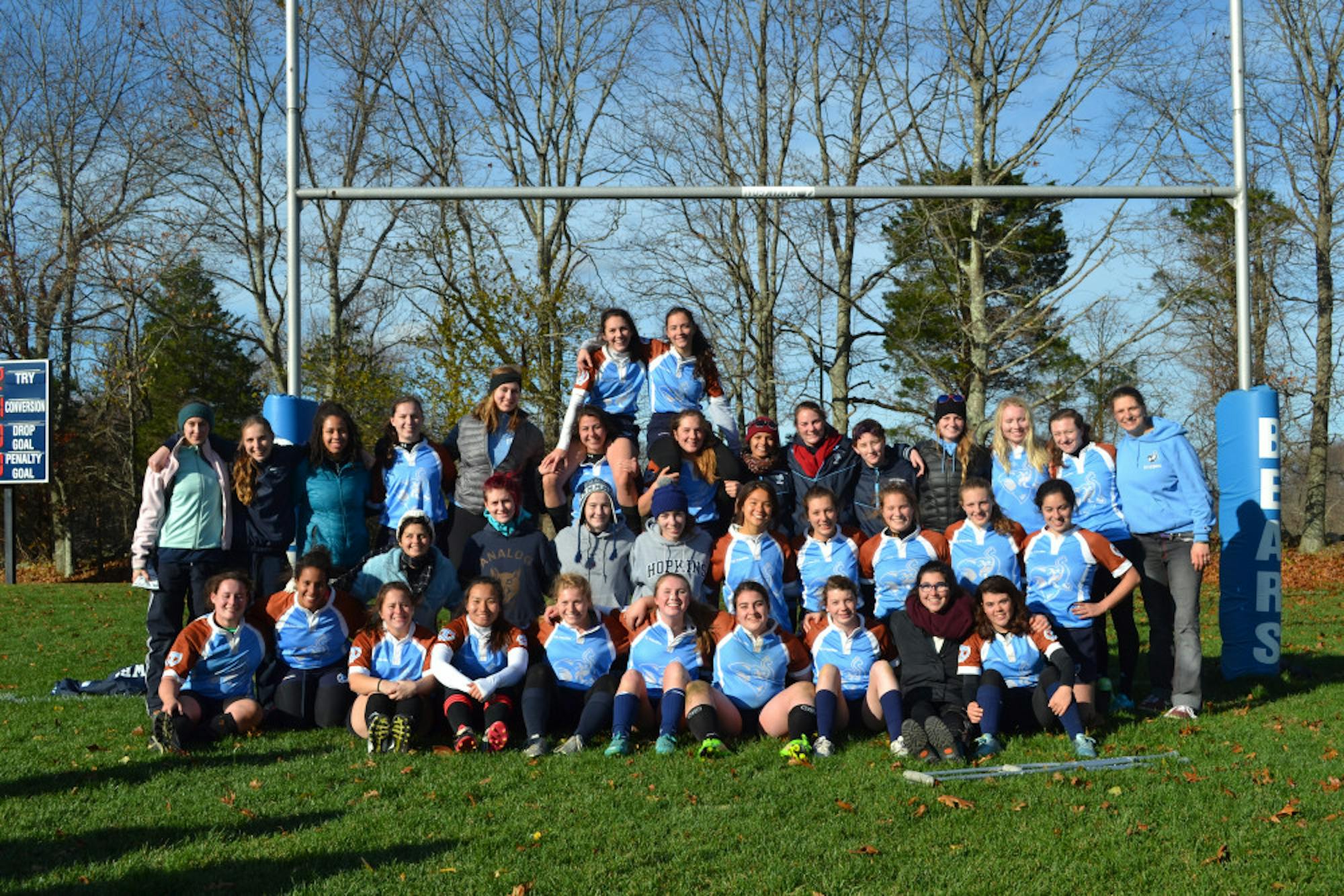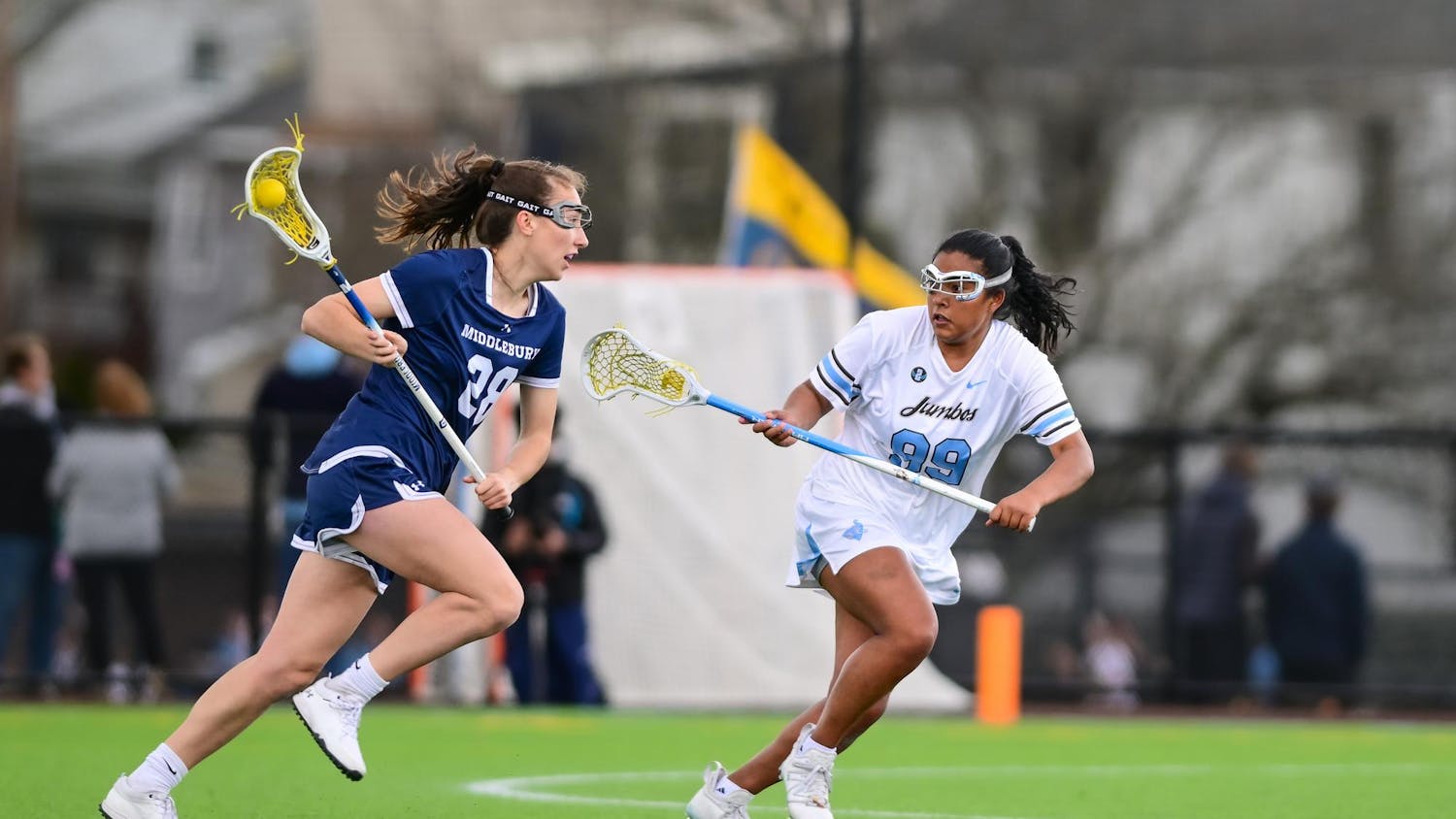It was the 1970s, and women’s sports were on the rise. The Title IX Act, which prohibited discrimination on the basis of sex in any federally funded education program or activity, had just recently been passed. There was not yet a women's rugby team at Tufts; in fact, Mary Money (E' 80), one of the Tufts Women’s Rugby Football Club’s founding members had never played nor even seen the sport before.
Money had been a varsity swimmer for Tufts in 1978. Tufts had a men’s water polo team at that time, and by the new ruling, the university was obligated to have a female team, too. Money and the rest of her teammates had never seen a game of water polo, but they decided to give it a shot. It was Money’s first experience with contact sports, and she loved it.
“We started to think about ourselves as athletes in a different way,” Money said.
While waiting for the bus during the players' first season, Money and a couple of her teammates watched a TV clip of women’s rugby players tackling and passing the ball as one unit. Soon after, the Tufts Women’s Rugby Football Club was born.
The path ahead seemed filled with uncertainty. Some members of the male rugby team had offered to train the squad, but many logistical challenges, such as finding opponents, remained.
“Figuring out how to set up games outside of the athletics department was challenging because we did not know who else we could play,” Money said.
The local Beantown Rugby Football Club assisted the Tufts team in putting players in touch with the Boston College and Boston University teams. Wherever the men played, the women followed, in the hope of building contacts with other schools.
The team's very first game was played against Beantown's B-side at Fletcher Field. Money said the experience was empowering.
“It’s a great sport for women because it makes you feel confident, powerful and strong, and none of us had played a game where we had to tackle,” Money said. “We loved it [and] we thought we were real pioneers, doing stuff other women have never done before.”
Part of why Money loved the sport so much was the team's great sense of camaraderie and humor.
"It didn't take [us] long to sing...dirty songs," Money said. “It was different in the '70s. Not many women had even said four-letter words out loud in public … And that was empowering to us ... All of a sudden, people found their voices.”
Bonding was also a key part of training and games, Money said. She believed that the physical nature of the sport helped strengthen the team's spirit.
“It was not a varsity sport, so we didn’t have a lot of school supervision, and training together for a physical sport was bonding in itself because we all thought we were members of a very special sport,” Money said. “We were speaking a new language -- talking about hookers, and scrum-halves -- that most Americans could not speak. When you look at the game of rugby, you’re physically connecting with your teammates, and it’s something that we women [had] never done...before. The pure newness of the whole thing helped the team bond, feel empowered, special and different.”
This team spirit and culture stuck with the squad. Kara Yimoyines (A '98) spent four years as a player before coaching the Tufts team from 2000 to 2013. She recalled being a player as an undergraduate:
“I remember driving with my co-captain in my senior year all the way to Rhode Island to pick up goalpost pads so that we could have games [and] we wouldn’t be injured,” Yimoyines said. “There weren’t many providers for rugby equipment back then, so we had to road-trip down to Rhode Island, and the whole way back we sang rugby songs.”
After leaving Tufts, Yimoyines went on to earn her rugby coaching certificate. Like Money, she was a pioneer, starting the girls’ rugby side at Marshfield High School. When Yimoyines returned to coach at Tufts in 2000, the team was going through a rough spell, having lost its coach two years earlier.
“I really didn’t want Tufts to lose the program because there was no decent coach,” Yimoyines said. “The team in the previous year had gone 0-6 and they only had about 15 people on their roster. I was young and passionate enough not to care if I was paid enough and I just stayed on after.”
In Yimoyines’ first season as coach, the team went 3-3, before narrowly missing out on the National Championships the following year. More importantly, however, Yimoyines helped restore some of the team's traditions.
“Some of the culture was lost as the size of the roster diminished and veteran players had disappeared,” Yimoyines said. “I taught them songs just so that they wouldn’t lose the oral history of the team. It was important they didn’t lose that part of the team’s tradition.”
Yimoyines, who has been involved in rugby for more than 20 years, said she enjoyed watching the women on her team grow.
“Rugby was more than just a sport; it was a rugby family, a group of women that bond within and also outside the sport,” Yimoyines said. “As a coach, it was a privilege to watch these women grow from 18 years old, coming into Tufts, watching them beyond their Tufts career and see the amazing things they do.”
Senior co-captain fly half Gracie Dietshe said her time with the rugby team has become key to who she is.
“I saw a poster for rugby at a different school and decided that was the sport for me,” Dietshe said. “After the first practice, I was hooked, and never left. Now it's a part of my identity.”
The fact that the team's alumnae are now at least 100-strong seems to suggest that the community is growing stronger. Ties within the rugby community go beyond team affinities, and reflect Money and the other pioneers’ attempts to reach out to as many different teams as possible, just to play and share their love for the sport.
“Rugby helps you to be a strong person and to find a community where [you're] comfortable," Yimoyines said. "You could be loud [and] obnoxious [in a way] that women were typically not allowed to be, but in a sportsmanlike way. You leave the animosity on the field and become friends after. It’s a valuable life lesson, too -- you go play hard, but you leave it on the field.”
Apart from being strong, the Tufts rugby community also prides itself on embracing people of all sexualities, though that was not always the case. At one point during Yimoyines' time as coach, the rugby team was labelled as homophobic -- an odd trait for a rugby team, Yimoyines said, since rugby is often seen as a welcoming sport for players of all sexualities.
"[W]e had an intervention of sorts with the LGBT community," Yimoyines said. “Some of the women gave their coming-out stories and we as a team sat and listened. Some of them shared why they felt uncomfortable being on the team, but since that moment, we’ve had an open, accepting, lesbian-friendly community.”
It is this all-encompassing nature that continues to make the team special.
“What draws people to rugby is the cultural core of the game, as it features a combination of camaraderie, loyalty and respect that’s not always found in other sports," coach Sam Perino said. “The Tufts women's rugby team embodies this culture and they act more like a family than a club sports team. At each match or practice, they support and push each other to be their best."
Rugby's growth in popularity in the United States over the years mirrors changing attitudes toward women in sport as well, Money said. During the 35th anniversary celebration of the team's founding, Money shared that in the 1970s, sports bras had not been invented yet and women were not yet allowed to participate in marathons because they were deemed physically unable to complete the 26.2 mile course.
Part of the beauty of rugby, Money said, is that it helps you learn to overcome adversity.
“You learn to work your butt off [in rugby], you learn to be disciplined, you learn teamwork [and] confidence in yourself,” Money said. “You certainly learn to get up when you’ve been knocked down.”
“Every single player is a story of resilience,” Dietshe said. “In the sport, you get hit hard, but every single player has gotten back up again and gone right back into the play.”
While the team no longer plays on Fletcher Field, the legacy started by Money and her teammates lives on today.
“The camaraderie is still very important, but it’s still an amazing social life with women who love to play rugby,” Money said. “Things have evolved, but it’s still the same rules as the men, still the same positions, still a game of 15 against 15, two 40-minute halves.”
Tufts Women's Rugby: A legacy of community

The women's rugby team poses for a group photo on Nov. 14.





